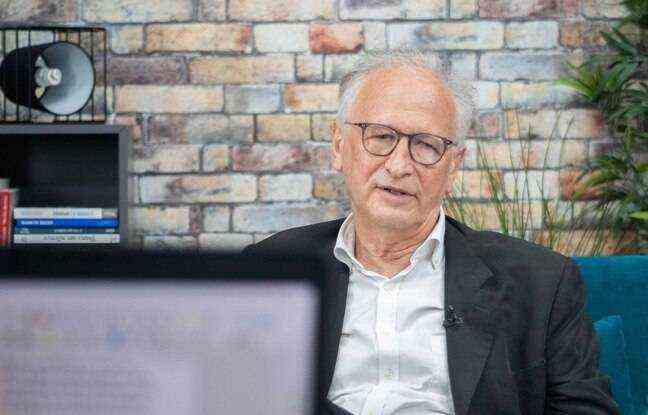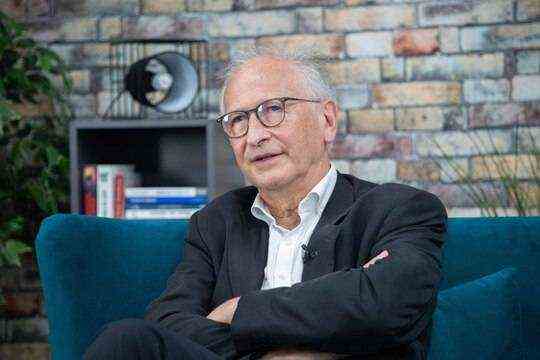Vaccination: Alain Fischer, the government’s Vaccine Mr., answers our questions – 20 minutes
- After a very gradual opening, all adults can now have access to vaccination against Covid-19.
- From June 15, French people between the ages of 12 and 18 will be able to receive injections.
- Duration of immunity, efficacy of vaccines, side effects, compulsory vaccination… Alain Fischer answered questions from our Internet users.
Every week, a new deal. The vaccine campaign against Covid-19 has undergone many twists and turns between its opening in late December and its expansion to all adults on May 31. To the point that some French people find it difficult to navigate …
While the acceleration of vaccination gives hope for a more peaceful summer,
Alain Fischer, appointed by the government to coordinate this campaign against the Covid-19, came to the drafting of 20 minutes. And answered the questions of our Net surfers.
Mélanie, 38 years old: “Vaccination for 12-18 year olds will be open from June 15, when half of French adults remain to be vaccinated. Do we not risk penalizing people who are more at risk? “
No, otherwise this kind of decision would not be taken! Fortunately, for those most at risk, vaccination is well advanced. It is not unreasonable to start that of adolescents, which will be done gradually.
I would very much like the school to participate. Not by asking teachers to vaccinate. Not even to school doctors and nurses, not enough in number. But by opening vacations to vaccinate doctors and nurses in schools and universities. It also allows to talk about vaccination in general. This is how in Britain they managed to vaccinate 80% of adolescents against papillomavirus (HPV) infections.
Jean-Michel, 71 years old: “The AstraZeneca vaccine is less effective (especially against variants). However, it is administered to people most at risk, because of their age. Isn’t this a clinical aberration whose justification is economic: a stock must be sold? “
This is not a cheap vaccination. Currently, in France, the British variant is responsible for 80% of infections. However, AstraZeneca is as effective as messenger RNA vaccines against this variant.
“Manufacturers tend to push for a recall in the fall. But each his job! “
Albessard, 60 years old: “The vaccine gives us immunity for how long? “
Good question ! What we know from clinical trials is that the protection is stable for six months. There are reasons to hope that it will go far beyond. A French study shows that thirteen months after infection, most people still have antibodies. But that does not allow us to say that we will have protective immunity a year later.
Clémentine, 28 years old: “Do you think that we should be vaccinated every six months or every year? “
Every six months, no. Manufacturers tend to push for a recall in the fall. But each his job! No precipitation, therefore, except for a particular variant, to vaccinate the healthy population. The question will arise of a recall at the end of the year of the elderly, and undoubtedly of caregivers.
Nicolas, 37 years old: “(Being) Covid long since March 2020, I did not have the possibility to be tested. Should we do in this case one or two doses of vaccine? “
Dose. You can also do a serology. Moreover, we will be offering a rapid serological test in vaccination centers in June. If the person has antibodies, there will be only one injection, so doses are saved. We will test it first. To see if it doesn’t worry people and if we don’t waste time. Apart from this particular case, there is no reason to perform serology. Especially after the vaccine …
Gachet, 38 years old: “I had a first injection of Pfizer, but two weeks later, I contracted Covid-19 with symptoms. Should I give the second injection and if so, when? “
Rather no. But it is not something solid. With common sense, we consider that a vaccine, then an infection, that represents two doses.

Simon, 33 years old: “Once vaccinated, you can receive and transmit the virus. So how does this protect others? “
Once fully vaccinated, the risk of getting infected does not go away completely. Vaccines that work 100%, I don’t know of any. But the level of protection of RNA vaccines against a severe form is 95%, and against infection it is 90%.
For a long time, we spoke of caution, because we did not have data on post-vaccination transmission. Today there is strong evidence from vaccination in Israel, Qatar. We can reassure: we protect ourselves and we protect others.
“It would not be ethical to vaccinate teenagers to replace adults”
Schwaller, 54 years old: “Shouldn’t we make the vaccine compulsory rather than vaccinating teenagers, even children, on the pretext that adults do not fulfill their role of child protection? “
It would not be ethical to vaccinate teens instead of adults. But it is not “instead”, it is “in addition”. Imagine that we manage to vaccinate 100% of adults, it would be good to also vaccinate teenagers. Because they play a role in the transmission of the virus. So vaccinated, they would participate in this collective protection.
But there are two other arguments. The first: because of the Covid-19, teens can have a inflammatory disease called PIMS. It’s rare – 125 teenagers in France in a year – but if it can be avoided, it’s better. Second reason, the strongest in my opinion: many teenagers have unfortunately suffered and are suffering because their school attendance has decreased. Some have dropped out, others develop psychiatric disorders.
What about compulsory vaccination? Emmanuel Macron replied “not at this stage” …
We must continue to work to bring about adherence. We have made a lot of progress. Today, hesitant or refractory people are in the order of 20%. We were at 50% four months ago. Through the ripple effect, vaccination becomes a norm.
But there are still people who don’t want to be vaccinated. The first job is to explain to everyone, and to young people in particular, that they have to do it: it is in their interest to get back to a normal life. The health pass will also be an incentive.
The other point of effort is to reach out to populations who want to, but cannot. We see that there are a fraction of the over 80s who are at home, who have difficulty getting around and we have to go to them. But this is also the case for certain chronic patients at risk such as the obese, those with psychiatric illnesses and drug addiction. Precarious people in migrant homes.
Mandatory vaccination would only be justified if after all these efforts – which brings us to the fall – there was insufficient vaccination coverage and an epidemic out of control. It would be a last resort.

Silva, 36 years old: “Why at the beginning, 70% of people vaccinated was necessary to achieve collective immunity while now, you claim 90%? “
Because the new variants make the disease more contagious. With the initial virus, a sick person infected 3. With the British variant, it is 4, and the Indian beyond. So today, it would take at least 75% of the population of all ages, so 90% of adults, to achieve collective immunity.
“It is irresponsible to believe that it is ‘just’ an old man’s disease”
Roberto, 52 years old: “If the pharmaceutical companies refuse to commit to the side effects, why should I take a risk by taking this experimental treatment when I am not part of the population at risk? “
I don’t think you can say that an industry cannot be sued if there is default. We have a low recoil of time, to be sure, but an impressive amount with hundreds of millions of injections. Never has a vaccine been so carefully monitored. No serious complications are observed. Except thrombosis with AstraZeneca, which is very rare.
On the other hand, the risk of the disease is known, the deaths, the hospitalizations, the long Covid … It is a disease which poisons the life of everyone. The vast majority of people hospitalized in intensive care today are under 70 years old and there are under 50 years old in real life. It is irresponsible to believe that it is “just” a disease of old people …
Sébastien, 40 years old: “What do you know about the medium or long-term side effects of messenger RNA vaccines? “
With vaccines in general, when there are side effects, they are immediate. Not six months, a year later. Things have been claimed, but inaccurate. For example, complications related to the aluminum adjuvant [il n’y a pas d’adjuvant dans les vaccins à ARN messager]. The RNA is used to make the protein and is broken down in three days. It is not likely to cause any particular problems.
People with cancer have been receiving messenger RNA vaccines for several years. In addition, RNA is used to treat certain rare diseases. In this case, these patients receive doses of RNA 5,000 times greater than the dose of RNA from vaccines… and every month. It’s a fantastic scientific breakthrough that will help us get out of the pandemic.
Armelle, 66 years old: “Why are the figures concerning the cases of Covid after vaccination not made public? “
This implies that we are hiding things. It is known that the onset of protection begins two weeks after the first dose. It is certain that there are cases during this period. This is not followed day after day, but these few cases do not call into question the effectiveness of the vaccines.

